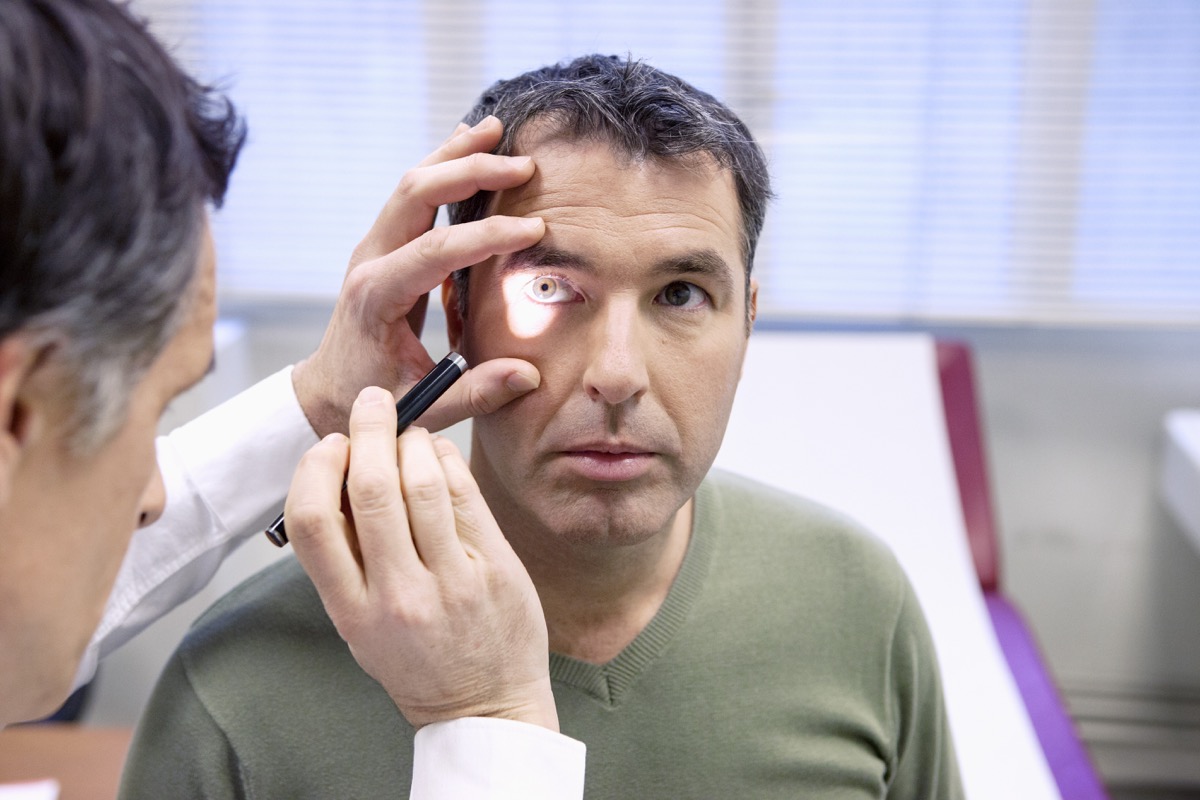45 Early Signs of Alzheimer's Everyone Over 45 Should Know
An early diagnosis can lead to a better outcome down the road.
Our 40s aren't what they used to be. At age 45, you may have very young children, decide to start a new career, or find yourself in peak physical shape. However, this doesn't mean that your biological clock isn't still ticking in the background—and this is especially true when it comes to your cognitive health and what that could mean for early-onset Alzheimer's.
According to the Centers for Disease Control & Prevention (CDC), nearly six million Americans are living with Alzheimer's disease—a figure that is expected to grow exponentially over the coming decades. And though it's much rarer for people under age 65 to be diagnosed with the disease, it is possible, and many of the earliest signs are all too easy to miss.
The Alzheimer's Association explains that misdiagnosis is common in younger people because healthcare providers don't regularly screen for dementia at this stage and symptoms may be misattributed to stress. But an early diagnosis can make all the difference in your quality of life down the road, which is why it's critical to understand the warning signs. Keep reading for the 45 early signs of Alzheimer's everyone over 45 should know, according to doctors and scientific studies.
RELATED: 6 Foods That Can Lower Your Dementia Risk, Science Says.
1
Diminished sense of smell

You used to be able to smell those fresh-out-of-the-oven chocolate chip cookies immediately, and now you hardly notice them. According to the National Institute on Aging, losing your sense of smell can be a symptom of Alzheimer's, so it's crucial to bring it up to your doctor if you notice any changes.
2
Walking slower

Alvaro Pascual-Leone, MD, PhD, chief medical officer and co-founder of Linus Health, a digital health company focused on enabling early detection of Alzheimer's and other dementias, tells Best Life that certain symptoms may appear before any of those related to memory.
One such sign is the "slowing of gait speed," he says. Another related symptom is "having a harder time walking and talking at the same time," he adds.
3
Trouble rebounding after being sick

No matter how healthy we are, battling the flu or skimping on sleep can leave us groggy and lethargic. But Pascual-Leone says it could be a marker of younger-onset Alzheimer's when someone has "more hesitation or attention slips after a bad night's sleep, illness or infection."
4
Becoming uninterested in things

One of the most common changes those with Alzheimer's go through is apathy, or no longer being interested in things they used to love—or much of anything, for that matter.
A 2001 study published in the Journal of the American Geriatrics Society revealed that while apathy is a frequent symptom among those with Alzheimer's, it's also one of the most under-recognized signs since it can be misdiagnosed for depression.
5
Becoming passive

While everyone enjoys a mindless Netflix binge from time to time, for those with Alzheimer's, passive behavior becomes the norm, according to University of California, San Francisco Health. Someone showing signs of the disease could sit in front of a screen all day, every day, with absolutely no interest in doing anything they used to.
6
Forgetting important dates and events

Forgetting certain things—like what you ate for dinner last Thursday—is normal. When you start constantly forgetting important dates and events, however, that could be an early sign of Alzheimer's, according to the Alzheimer's Association.
Pay attention to how often little things slip your mind—and if it starts to become a persistent problem, talk to a doctor about the possibility of dementia.
7
Forgetting the names of friends and family members

One of the most crushing things those with Alzheimer's go through is forgetting the names of those around them, whether they're close family members or longtime friends.
According to the Alzheimer's Association, if you forget names only once in a while and remember them later, that's a normal age-related change. But when it becomes frequent, it's advisable to speak to your doctor.
8
Putting things in strange places

Everyone forgets where they put their keys once in a while; sometimes you're so tired that you might accidentally put them in the fridge, and that's totally normal.
For those with Alzheimer's, though, misplacing possessions and putting them in places that don't make sense happens with startling frequency, according to the Alzheimer's Association. It's also symptomatic when a person is unable to retrace their steps to find these misplaced items.
9
Forgetting the names of everyday objects

Have you ever found yourself struggling to retrieve the word for an everyday object? Now, imagine going through that constantly. According to the Mayo Clinic, those with Alzheimer's often find themselves unable to remember what simple things are called, be it the toaster or their toothbrush.
RELATED: The Perfect Time to Start Hormone Therapy to Slash Dementia Risk.
10
Difficulty seeing contrast

While contrast isn't an issue for most people, it's one of the vision problems that those with Alzheimer's may exhibit. According to a 2004 study published in the journal Clinical Nutrition, this issue can make it hard for someone to differentiate a liquid from its container, like milk in a jug.
The Alzheimer's Society recommends making small changes around the home so contrasts are more obvious if you or someone you live with gets diagnosed with this disease. (For instance, make the color of light switches different than the color of the wall so they're easier to see.)
11
Issues with depth perception

Needing reading glasses as you age might not be fun, but it's normal. On the other hand, according to Michigan State University, having trouble with depth perception—in other words, not being able to see the world around you in three dimensions (as in length, width, and height)—can be a sign of Alzheimer's.
12
Having posterior cortical atrophy (PCA)

Yet another vision problem that may be a sign of Alzheimer's is posterior cortical atrophy (PCA). According to the Mayo Clinic, PCA is "a brain and nervous system syndrome" that "causes the loss of brain cells in [the] back of the brain." This is the region of the brain that is "responsible for visual processing and spatial reasoning," they note.
Therefore, symptoms of the condition include being unable to judge how far away something is, being unable to differentiate between moving objects and those that are still, and being unable to identify left from right.
As Best Life recently reported, a study published in Lancet Neurology on Jan. 22 found that PCA "overwhelmingly predicts Alzheimer's." Specifically, 94 percent of the study participants with PCA had Alzheimer's pathology, they observed.
13
Becoming socially withdrawn

When someone who used to love being around others suddenly becomes a lot more socially withdrawn, it could signal a brain change often associated with Alzheimer's.
Oftentimes, this shift is due to the person's awareness of the other cognitive deficits they're experiencing: They don't want to embarrass themselves by forgetting someone's name, for instance, and will therefore remove themselves from the social situation entirely, explains the Alzheimer's Association.
14
Trouble initiating conversations

It takes a certain skill set to make good conversation—and it takes confidence, too. But if you've always been a social butterfly and you suddenly find that you can't so much as utter a greeting to an old friend, this could be one of the early signs of Alzheimer's, as the Alzheimer's Association notes.
Similar to social withdrawal, those with Alzheimer's often avoid conversation in order to hide their mental decline.
15
Trouble engaging in conversation

Likewise, having trouble staying engaged in a conversation could also be a sign of early-onset Alzheimer's.
"Occasionally losing your train of thought is normal, but losing the ability to stay engaged in a conversation or to express thoughts or feelings correctly may be a sign of cognitive changes in older adults that should be noted," explains Tate Stewart, senior vice president of operations with Thrive Senior Living.
16
Stopping mid-conversation

If you find yourself or someone else stopping in the middle of a conversation, it could be an early sign of Alzheimer's. The Alzheimer's Association notes it's very hard for an individual to jump back into the dialogue when this is the case.
17
Using the wrong word

If someone is substituting unusual words into their sentences when they're talking or writing, it may be a red flag. It's not uncommon for someone with Alzheimer's to "struggle to find the right words, use incorrect terms, or appear to have difficulty understanding conversations," says Stewart.
18
Struggling in chaotic situations

Attending a massive wedding where you know no one and aren't familiar with the customs qualifies as an instance where even the most outgoing among us would flounder.
But Pascual-Leone tells Best Life that, on a more everyday scale, "getting more stressed and possibly even confused when lots of things are happening, such as during a family gathering, party or trip" may be an early-onset Alzheimer's symptom.
RELATED: People Who Live to 100 Have These 3 Things in Common, New Research Shows.
19
Withdrawing from work

It's just not your social circle that Alzheimer's can cause you to withdraw from. According to the Alzheimer's Association, it's also common for people with the disease to no longer want to be at work, as it becomes harder to keep up with everyday tasks—even ones as simple as having conversations with co-workers.
20
Irritability

Everyone becomes irritable at times. It's part of life. However, experiencing this emotion is also something that's been found to be a consistent early sign of Alzheimer's.
In a 2015 study published in the journal Brain, researchers analyzed seven years of data and found that one of the key behavior changes in Alzheimer's patients was irritability, which results from all the cognitive changes happening to the individual.
21
Depression

Depression is often accompanied by a lack of energy, trouble sleeping, appetite loss, and feelings of hopelessness. And while the mental health disorder affects individuals of all ages, it could also be an early warning sign of Alzheimer's.
In a 2012 study published in the journal Archives of General Psychiatry, researchers found that those who are depressed—both later in life or since middle age—might have a higher risk of developing dementia.
22
Heightened anxiety

If someone gets more and more anxious over the years, it could be an early symptom of Alzheimer's disease. In a 2018 study published in the American Journal of Psychiatry, researchers found that there's a link between the two.
As anxiety symptoms increased in study subjects over time, so did the beta-amyloid proteins in their brain—and high amounts of those proteins are a known characteristic of Alzheimer's.
23
Increase anxiety at the end of the day

Anxiety may also manifest in a very specific pattern in Alzheimer's sufferers.
"People with Alzheimer's can experience increased confusion and anxiety during the evening and at night," explains Alzheimer's Research UK. "This is called sundowning."
24
Getting lost in familiar places

There's no worse feeling than getting lost and not knowing how to get back home—and for those with Alzheimer's, that feeling may be an everyday occurrence. This often happens to Alzheimer's patients even in places that should seem familiar, like their favorite hiking trail.
25
Trouble with the passage of time

Most people can tell the difference between a few minutes and a few hours. But those with Alzheimer's may have a skewed perception of time and "may lose track of dates, seasons, or the passage of time," according to Eric Tam, MD, physician at Mighty Health.
26
Becoming aggressive

Suddenly showing aggression by lashing out at family members is common among those with Alzheimer's, according to the National Institute on Aging. Unfortunately, it can also be hard to figure out what's behind their hostility—and occasionally, those fights can even become physical.
27
A shortened attention span

As Alzheimer's spreads in the brain, one issue that might pop up is a shortened attention span. Someone who used to be able to sit and have a full conversation might no longer be able to focus on just one thing for more than a few minutes or even a few seconds, according to the National Institute on Aging.
RELATED: Drinking Coffee and Tea May Help Prevent Two Leading Diseases, New Science Says.
28
Sudden mood swings

Everyone has their ups and downs, but a sign of Alzheimer's you should never ignore is when someone has rapid emotional shifts for no reason. They could go from smiling to crying in a short time, according to the Fisher Center for Alzheimer's Research Foundation.
29
Getting agitated over small things

Becoming frequently agitated could be a major red flag when it comes to Alzheimer's. As the National Institute on Aging notes, the restlessness and mental issues that plague those with the disease can be hard to deal with, and that frustration often leads to irritation over minor issues.
30
Becoming suspicious or distrustful of others

Instead of counting on those closest to them like they did before, some individuals with early-onset Alzheimer's become distrustful of those around them. The combination of confusion and memory loss can contribute to these false beliefs.
31
Sleeping during the day

People suffering from Alzheimer's very often sleep during the day, which has long been attributed to a poor night's rest.
However, a 2022 study published in the journal JAMA Neurology found that this is more likely due to a "loss of subcortical wake-promoting neurons at the early stages of neurodegenerative disease."
32
Trouble keeping track of and paying bills

In the early stages of Alzheimer's, working with numbers becomes difficult, making it difficult to pay bills on time and in the correct amount. Pascual-Leone says someone with the disease may also have trouble balancing a checkbook or simply handling money.
33
Decline in physical hygiene

Even if someone was strict about keeping up with good hygiene before, that may change once they begin to showcase signs of Alzheimer's.
Due to the changes in cognitive function that occur with this disease, "some individuals with dementia will forget what good hygiene means, such as brushing their teeth, taking a bath, toileting, or changing their clothes," according to the Alzheimer Society of Canada.
34
Wearing off-season clothing

Those in the early stages of Alzheimer's often begin to exhibit a perplexing symptom: dressing inappropriately for the weather. Some individuals with the condition will wear minimal clothing when it's cold out, while others will dress in heavy layers in the summer when the hot sun is beating down on them.
35
Not being able to follow recipes

Something as minor as whipping up a home-cooked meal can be a struggle for those in the early stages of Alzheimer's. If someone loses their ability to follow a recipe—especially one they've made many times before—that might be an indication of the cognitive changes that commonly occur in the early stages of the disease, notes the Mayo Clinic.
36
Not being able to play familiar games

Similar to following a recipe, playing games involves multiple steps. So, if someone is suddenly unable to play their favorite card game after years of doing so, that could be an early sign of Alzheimer's, according to the Mayo Clinic.
RELATED: 7 Daily Ways to Keep Your Brain Young.
37
Forgetting conversations

It's happened to all of us: We zone out during a conversation and find ourselves with little recollection of what transpired during the chat. But constantly forgetting discussions—and being unable to remember them later, even after being reminded—is a common symptom of Alzheimer's.
38
Forgetting you've already said something

Once in a while, you may have to repeat something to make sure the person you're talking tohears it. But if an individual is constantly repeating statements or questions without any recollection of having already said them, that may be an early indicator of Alzheimer's.
39
Difficulty making phone calls

Even if someone has had a standing phone call with a friend for years, or knows the number of their favorite takeout restaurant by heart, they may find themselves forgetting those phone numbers if they're experiencing the changes associated with early Alzheimer's.
40
Engaging in impulsive behavior

As Alzheimer's disease progresses, sufferers may start engaging in more impulsive behaviors—and that can mean anything from undressing in public to going on shopping sprees.
41
Exhibiting poor judgment

It's not uncommon for someone with Alzheimer's disease to show poor judgment on a regular basis—even in some cases by giving a large portion of their money away to strangers.
42
Trouble multitasking

In today's world, we often do many things at once—we listen to podcasts while we work, watch TV while we exercise, and have conversations while staring at our phones. For those with Alzheimer's, however, multitasking can be extremely difficult, even in situations they once handled with ease.
43
Feeling extremely indecisive

Some people are more indecisive than others, but when someone is regularly "finding it harder to make plans and decisions," it could be a sign of younger-onset Alzheimer's, Pascual-Leone notes.
44
Taking longer to complete basic tasks

As most people get older, they tend to slow down a little bit, both physically and mentally. However, if someone is losing the ability to follow plans and has trouble concentrating, meaning things take considerably longer than they used to, that could be an indication of early-onset Alzheimer's.
45
Needing memory aids

When your memory is in good working order, you can recall most things without always having to write them down or be reminded. However, those in the throes of early Alzheimer's become more dependent on memory aids—such as reminder notes or electronic devices, as the Alzheimer's Association notes—and often need their friends and family members to help them out.
Best Life offers the most up-to-date information from top experts, new research, and health agencies, but our content is not meant to be a substitute for professional guidance. When it comes to the medication you're taking or any other health questions you have, always consult your healthcare provider directly.
- Source: CDC: Alzheimer’s Disease and Related Dementias
- Source: Alzheimer's Association: Younger/Early-Onset Alzheimer's
- Source: National Institute on Aging: How Smell and Taste Change as You Age
- Source: Journal of the American Geriatrics Society: Apathy in Alzheimer's disease
- Source: Alzheimer's Association: 10 Early Signs and Symptoms of Alzheimer's and Dementia
- Source: Mayo Clinic: Alzheimer's disease
- Source: Clinical Nutrition: Visual contrast enhances food and liquid intake in advanced Alzheimer's disease
- Source: Mayo Clinic: Posterior cortical atrophy
- Source: Lancet Neurology: Demographic, clinical, biomarker, and neuropathological correlates of posterior cortical atrophy
- Source: Brain: Early behavioural changes in familial Alzheimer’s disease in the Dominantly Inherited Alzheimer Network
- Source: Archives of General Psychiatry: Midlife vs late-life depressive symptoms and risk of dementia
- Source: American Journal of Psychiatry: Longitudinal Association of Amyloid Beta and Anxious-Depressive Symptoms in Cognitively Normal Older Adults
- Source: National Institute on Aging: Coping with Agitation and Aggression in Alzheimer's Disease
- Source: National Institute on Aging: What Are the Signs of Alzheimer's Disease?
- Source: JAMA Neurology: Subcortical Neuronal Correlates of Sleep in Neurodegenerative Diseases






















